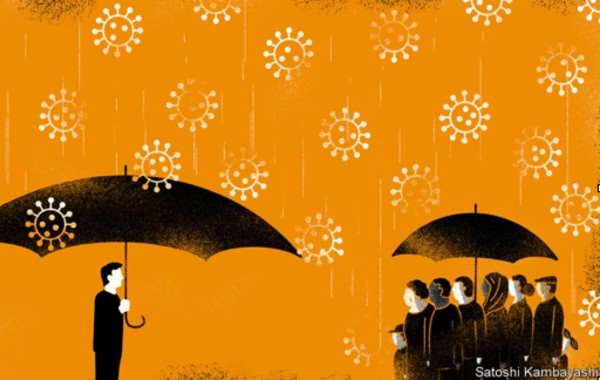
Illustration by Satoshi Kambayashi
Result CIC Advisor, Jackie Driver OBE, reflects on Covid's uncovering of health inequalities.
June 2021 and I turn 60. Somewhat of an achievement. I was also honored this year with an OBE for my work addressing equality, diversity, and inclusion. We call the OBE the Order of British Equality to avoid the association with an era too painful and shameful for too many.
Demographic research suggests that at the beginning of the 19th century no country in the world had a life expectancy longer than 40 years. Almost everyone in the world lived in extreme poverty, we had very little medical knowledge, and in all countries, our ancestors had to prepare for an early death.
Over the next 150 years, some parts of the world achieved substantial health improvements. A global divide opened. In 1950, the life expectancy for newborns was already over 60 years in Europe, North America, Oceania, Japan, and parts of South America. But elsewhere a newborn could only expect to live around 30 years. The global inequality in health was enormous in 1950: People in Norway had a life expectancy of 72 years, whilst in Mali, this was 26 years. Africa as a whole had an average life expectancy of only 36 years, while people in other world regions could expect to live more than twice as long.
A timely birth for me in 1961 in the UK then. Today most people in the world can expect to live as long as those in the very richest countries in 1950. The United Nations estimates a global average life expectancy of 72.6 years for 2019 – the global average today is higher than in any country back in 1950.
The almost unbelievable progress the entire world has achieved over the last two centuries should be encouragement enough for us to realize what is possible.
Moreover, I am in good health. However, the biggest shift since the second world war - the coronavirus pandemic caused a sharp fall in life expectancy in 2020, and as we are all too painfully aware, it was no equalizer - either globally or across the UK, the pandemic exposed underlying fault lines, hidden in not so plain sight, of significant health inequities based largely on your ethnicity, migration and/or your disability.
In the UK, in 2021, there remains a systematic relationship between deprivation and life expectancy, known as the social gradient in health. Males living in the least deprived areas can, at birth, expect to live 9.4 years longer than males in the most deprived areas. For females, this gap is 7.4 years. People in more deprived areas spend, on average, a far greater part of their already far shorter lives in poor health.
The evidence is clear and indisputable - the social determinants of health - your housing, economic circumstance, educational opportunities, employment, and so on are the contributing factors towards whether you die early and whether you live with one or more life-limiting co-morbidities. This week, the latest evidence from Sir Micheal Marmot places the Covid-19 mortality at 25% higher in Greater Manchester than in England as a whole.
It is clear, Greater Manchester has deep-seated problems of poverty and relative disadvantage that damage health and health equity. I work in the field of health and care, and remain horrified and deeply saddened by the ever-increasing numbers of friends and colleagues who have been victims to Covid.
Access to health services refers to the availability of services that are timely, appropriate, sensitive, and easy to use. Inequitable access can result in particular groups receiving less care relative to their needs, or more inappropriate or sub-optimal care, than others, which often leads to poorer experiences, outcomes, and health status. Access to the full range of services that can have an impact on health includes access to preventive interventions and social services, as well as primary and secondary health care.
Would it be that these inequities were not entirely avoidable, we would no doubt be saddened and go about continuing to try to reduce the disparate outcomes alongside the myriad other priorities deemed important to public health. But the fact remains, these are unwarranted inequities - largely the result of long ignored or poorly tackled systemic discriminations. It screams unfairness - something in the UK we purport to have running through our DNA.
So, one of the reasons I write this blog for Result CIC is to laud the work they do. Their single-minded focus to support those groups of people inherently disadvantaged because of their ethnicity, migrancy, sexual orientation, or disability is borne from insight and knowledge. I am super proud of their focus but also their ability to recognise what will make a difference and then just do it. It sounds a simple proposition, but far too many people, including those whose job it is - our public servants - feel they either don’t have the agency, capacity, budgets or wherewithal to make this happen.
We often ask, what will it take? - well now we know what it takes - it has taken a pandemic the scale and size of the one we are still in - and we know what is possible - the unbelievable progress on life expectancy in the last two centuries is the precedent we have to build on.
Avoidable, unwarranted health inequities have to be the next seismic change we make in our public health history, so future students can awe and wonder how we ever allowed it to reach the depths it has. We must make it our priority to undo, dismantle and remove from our systems the entrenched unfairness we have allowed to fester for too long.
Read more about Jackie Driver, OBE, here.